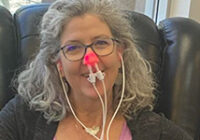Following is the story of a patient who first came to the Paracelsus Klinik in January 2007, and who over the course of 30 months experienced a complete recovery from ulcerative colitis, a condition he had suffered from for the previous nine years. The patient has asked that his name be withheld, but would be glad to discuss his case with other potential patients of the Paracelsus Klinik, upon referral by Dr. Rau.
The patient, a businessman now in his late 30’s, was diagnosed with ulcerative colitis for the first time in 1998 at a New York hospital. While conventional medicine does not currently acknowledge any causes for ulcerative colitis, the patient believes that, at least in his case, the condition had several identifiable direct causes: allergens in foods (particularly pork and cow milk products), excessive sugar (particularly in soft drinks and desserts), heavy metal toxicity (from amalgam dental fillings), and stress.
After the patient’s initial colonoscopy in 1998, the colitis was treated with mesalamine enemas and pills, and went into remission after about nine months. Over the next six years, it remained generally in remission, with brief flare-ups. No medication was taken during this period.
In 2004, the colitis appeared again. A colonscopy conducted at that time, by another New York hospital, found “moderate to severe acute colitis.” Again, it was treated with mesalamine enemas and pills, and again after some months it went into remission, after which the mesalamine was discontinued.
At the beginning of 2006, the symptoms appeared again. This time, the mesalamine enemas and pills could control the symptoms, but were no longer capable of putting the condition into remission, such that the mesalamine could be discontinued.
For the patient, medication had thus become a part of his daily life, with no prospect for improvement A further risk existed: that the mesalamine (whose side effects are supposedly minimal) would continue to lose its force, and that the patient would need to escalate to immunosuppressives or steroid medications, which can have significant side effects.
Conventional gastroenterologists at several leading hospitals were unable to suggest any path to recovery. They also consistently advised that it made no difference what food or drink the patient consumed.
In January 2007, the patient came to the Paracelsus Clinic. He began (starting 4 weeks before his visit) the Paracelsus Diet, and followed it. He was put through a battery of tests at the Clinic, and had all his amalgam fillings (19 of them) removed at the Paracelsus Dental Clinic. He was prescribed dietary supplements to rebuild the damaged lining of the intestine, and to help drain the heavy metals out of his system which had accumulated from the amalgam fillings.
Recovery was gradual, and had ups and downs. His body reacted better to some dietary supplements than to others, so some adjustments were necessary. Throughout the process, the positive spirit of the Paracelsus Clinic doctors and nurses, who believed in his recovery, had a good effect.
Every six months or so, he returned to the Clinic for tests and treatment. Each time, he could see from test results that the heavy metals in his body were diminishing. And steadily, he was able to reduce the amount of conventional mesalamine medication he was taking.
In May 2009, a colonoscopy found his intestine to be fully normal, with no sign of colitis. The result was expected, as the patient had for several months been able to fully discontinue the mesalamine medication, with no recurrence of symptoms.
Today, the patient continues to generally follow the Paracelsus Diet, and continues to take some dietary supplements to rebuild the intestinal lining. He believes that conventional gastroenterologists do a disservice to their colitis patients, when they tell them that it does not matter what they eat or drink. And he is thankful to live a life without daily medication, feeling that life presents challenges enough even to the healthy.”










